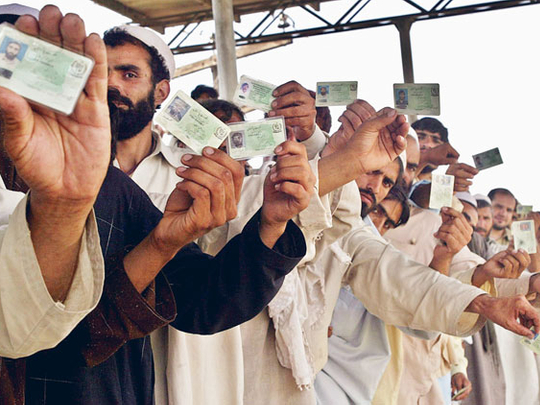
Peshawar: The fact that Pakistani militants are crossing the Pakistan-Afghan border to fight with the Taliban in Afghanistan became evident again when bodies of seven men killed in the fighting were brought to Pakistan in mid-June.
They were brought to be buried in their ancestral villages in Lakki Marwat, Bannu and Karak districts in southern part of Khyber Pakhtunkhwa province.
Their families said the men were killed in Nato airstrikes in Satto Kandao area in Afghanistan's Khost province. Satto Kandao is a mountain pass linking Khost to Paktia province and is known as a sanctuary for Afghan Taliban militants linked to the Haqqani Network.
The flow of Pakistani militants entering Afghanistan to fight on the side of the Afghan Taliban has dropped considerably.
This is due to the fact that the Pakistani Taliban need to defend their strongholds in Pakistan's tribal areas against military operations by the Pakistani security forces.
However, there are exceptions as some Pakistani militants don't want to fight the Pakistan Army and consider the fight in Afghanistan as the real "jihad" against the Western forces. Others have been fighting in Afghanistan for years and want to continue fighting there.
In the meantime, Pakistan's biggest and richest city, Karachi, is again suffering from ethnic killings as 10 persons were killed recently.
Killings were also reported in Hyderabad, the second biggest city in the southern Sindh province.
The MQM-Haqiqi, a splinter group of the ethnic MQM, reported that one of its activists was among those slain.
Those killed in Karachi and Hyderabad included people from different ethnic, sectarian and political groups. Among them were Urdu-speaking Mohajirs, Pashtuns and Baloch.
A few belonged to the MQM, others to the ANP, the Sunni Tehrik, the PPP and the Baloch groups.
The killings have led to angry protests and closure of roads in localities where the killings have occurred.
Karachi, it is paralysed in places where such incidents take place.
The police have been unable to take action against the mafia-type organisations accused of target-killings as they are protected by ruling political parties including the MQM, PPP and ANP in Karachi.
At the same time there has been rise in violence in Balochistan.
The Baloch separatist groups called a strike to protest the killing of two activists of the Azad faction of the Baloch Students Organization (BSO), also known as BSO-Azad.
The strike was quite effective in some Baloch-populated districts.
The BSO-Azad had given the call for strike to protest the killing of its two members in Khuzdar district.
It blamed the security forces for the killings, but the police said the two persons were killed by unknown gunmen on a motorbike, who sped away.
The BSO-Azad members and supporters torched several government offices in Khuzdar and Turbat districts. They blocked roads including the Karachi-Quetta highway and ensured that markets in the cities and towns were shut down.
Two men were also shot dead in Khuzdar and Awaran and they could be Punjabi settlers, who have been the target of Baloch separatists.
The strike and the ensuring violence was evidence of the tense situation prevailing in Balochistan due to the low-intensity insurgency in the province and the radicalisation of the Baloch youth.












